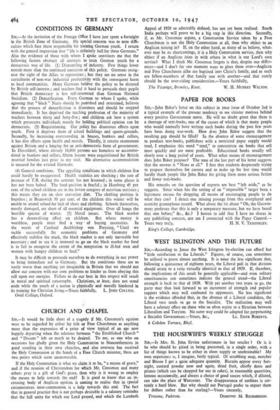CONDITIONS IN GERMANY
Sra,—At the invitation of the Foreign Office I have just spent a fortnight In the British Zone of Germany. My special concern was to note diffi- culties which face those responsible for training German youth. I return with the general impression that "life is definitely hell for these Germans." Also the evidence of those with whom I spoke convinces me that the following factors obstruct all attempts to train German youth for a democratic way of life. (1) Dismantling of industry. Few things lower morale more than the continued execution of this policy. Germans recog- nise the right Of the Allies to reparations ; but they see no sense in the curtailment of non-war industrial productivity _with the consequent harm to local communities. Many Germans belave the policy to be dictated by British self-interest ; and teachers find it hard to persuade their pupils that British democracy is less self-interested than German National Socialism. (2) Denazification. Every German to whom I spoke, while agreeing that " black " Nazis should be punished and restrained, believes that the process of denazification is disastrous and should be stopped immediately. It has deprived the teaching profession of the majority of teachers between thirty and forty-five ; and children ask how a system which persecutes individuals merely for holding political opinion can be democratic. (3) Requisitioning. Our policy has disastrous effects upon youth. First it deprives them of school buildings and sports-grounds. Secondly, by increasing overcrowding in houses, bunkers and cellars, it has dire effects upon health and morals. Thirdly, it creates resentment against Britain and a longing for an anti-democratic form of government. In Diisseldorf, where already 16,000 persons are homeless or accommo- dated in bunkers and cellars, fifteen houses were requisitioned for British married families just prior to my visit. No alternative accommodation is ensured for the evicted Germans.
(4) General conditions. The appalling conditions in which children live could hardly be exaggerated. Health statistics are shocking ; the rate of increase of T.B. during the summer has not lessened ; in some places it has not been halted. The food- position is featful ; in Hamburg 45 per cent. of the school children are in the lowest category of nutrition statistics ; this means they are on slow starvation diet. The clothing position is hopeless ; at Brunswick 50 per cent, of the children this winter will be unable to attend school for lack of shoes and clothing. Schools themselves, mostly damaged, are short of all essential equipment. Over all hangs the horrible spectre of winter. (5) Moral issues. The black market has a demoralising effect on children. But where money is worthless, people must find a way of buying necessities. In the words of Cardinal Archbishop von Preysing, "Until we tackle successfully the economic problems of Germany and effectively stabilise the mark, the black market is not only inevitable but necessary ; and to say it is immoral to go on the black market for food is to fail to recognise the extent of the temptation to ill-fed men and women with hungry children to feed."
It may be difficult to persuade ourselves to do everything in our power to bring immediate aid to Germany. But the conditions there are so vastly worse than anything yet imaginable in Britain that we should not allow our concern with our own problems to hinder us from obeying this call upon our energies. Failure to do our best in this respect will result in moral and spiritual catastrophe. Christians, at least, dare not stand aside while the youth of a nation is physically and morally hindered in


































 Previous page
Previous page